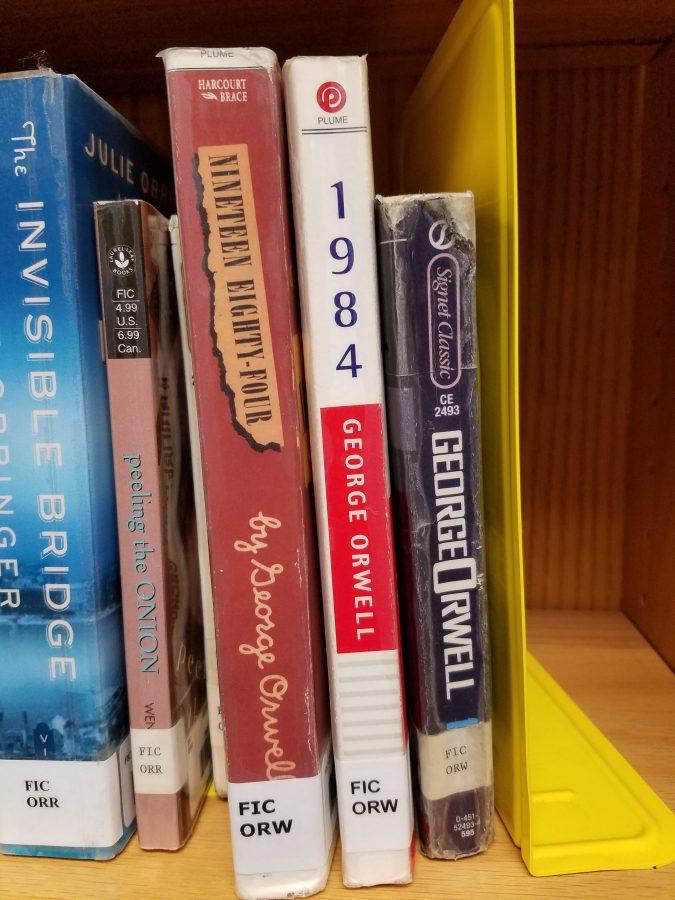Orwell in America
1984 has sold at least 47,000 copies in print alone since November 8th (source: Nielsen BookScan).
“In times of universal deceit, being in the right is considered a revolutionary act.”
This quote was the spirit of the classic 1949 novel Nineteen Eighty-Four by George Orwell. This novel is one of the most well known, most quoted, and often misquoted works of literature published in the last century.
Orwell, real name Eric Arthur Blair, was born in 1903. He worked as a journalist and writer for most of his life, and the topics of his work included social and literary criticism, what it meant to be British, and the experience of the “ordinary folk” he felt the intellectuals of Europe ignored. Orwell identified politically as a socialist, and wrote fondly of socialism in works such as Homage to Catalonia. He was also a convert to the British Anglican Church, and adopted a son, Richard Orwell. Though his work encompassed a wide variety of topics, he is best remembered for his two novels he published after World War II: Animal Farm and the aforementioned Nineteen Eighty-Four.
The latter featured a shocking and profound totalitarian world where the truth its citizens were allowed to know was determined by the central government. In the wake of this shocking novel, the term “Orwellian” was coined to describe the surveillance state and propaganda machine that people observed to be growing around them.
Do we in the 20th century still understand Orwell’s message? This investigation begins before the book was written, at the advent of the last world conflict of the 20th century: The Cold War.
The novel was first published in 1949, a year before the author’s death in 1950. It is without a doubt his most popular work, and today sales figures continue to rise in the wake of a controversial election.
Amazon sold out of physical copies a few weeks ago. In order to answer the question, “Is 1984 applicable to 2017?” first, we must ask why Orwell wrote the book in the first place.
At the time, there were two major political influences in the world: the United States of America and other members of the North Atlantic Treaty Alliance, and the United Soviet Socialist Republics, the undisputed leader of the Warsaw pact. Though at first glance it seems that the Soviet Union was the main target of the book’s ire, both nations could be said to carry out Orwellian acts.
The United States, thanks to such institutions as the House Un-American Activities committee, effectively converted Hollywood into an anti-communist propaganda machine, and in turn, Hollywood readily exported these Red Scare-era films to other liberal democracies in the West. Meanwhile, Stalin’s central committee already owned every camera, printing press, and radio station in Russia, and he knew how to use them to his advantage.
For a freedom loving journalist like Orwell, the militarization of the press and the media must have been infuriating. So with the knowledge of the book’s inspiration and context, the next step in this inquiry is to dissect the events of the book, as well as their inspiration from the past, and compare them to the events of today.
In the novel, a single government entity, the Ministry of Truth, regulates every single print and radio broadcast in the massive trans-continental nation of Oceania. Orwell was most likely inspired by the Soviet department of Agitprop (From which the terms “Agitprop” and “Pravda” were coined.) While our history books tend to gloss over the finer details, western powers had their own, more subtle version of the Ministry of Truth. The HUAC is one example, and the CIA also kept tabs on the activities of leftist political parties.
In today’s age of horribly impartial media, it’s not hard to see aspects of “Minitrue” in our news. CNN, FOX News, Breitbart, and the New York Times all have clear political narratives. Propaganda is nothing new; however, the most sinister attribute of Orwell’s world lies deeper. Oceania’s party broadcasts built a cult of personality around their leader, Big Brother (an allegory for Stalin,) and a cult of hate around their enemy, Emmanuel Goldstein (an allegory for Stalin’s communist enemy Leon Trotsky, or possibly for Churchill and Eisenhower.) Do modern politics seem to mirror this?
President Trump sure seems to have built himself a cult of personality, or at least his supporters have. Every news station in the last year has been constantly publishing articles exposing Trump and praising Clinton, or vice versa. Beyond a monopoly of the press, and therefore control of the narrative, Minitrue had one last, and most insidious tool at its disposal. The government did not control just the story – they controlled the facts.
Individuals that fell from grace were purged from all media and all documents. Updates on the war effort were constantly positive, even if the war was not. And according to public record, Oceania was producing an ever growing surplus even as factories closed. In this lies the true nature of the word “Orwellian.” Just as the McCarthyist senate blacklisted and censored films and Stalin airbrushed old disloyal Bolsheviks out of government photos, our own government may also be guilty of manipulating the truth.
Following the EPA censorship scandal, concerned individuals now raise questions about the character of the new administration. It may well be, however, that the largest threat to public information might not sit solely in the White House. News networks, publications, and other informative media are becoming more politically polarized than ever.
Coupled with the ideological rigidness of modern politics and the influence of wealthy industrial lobbies, situations can occur such that the debate on something as apolitical as scientific theory is happening in political arenas. Should the alleged Orwellian character of modern government be a cause for concern? The short answer is “yes,” but the long answer is, “this should have been concerning years ago.”
What Donald Trump is doing to media now has been foreshadowed for years. Excessive involvement between politicians and news outlets has caused the media to be dubbed a “fourth branch” of government. While it seems impossible now to find the straight truth on television or online, the newfound popularity of 1984 could be a good omen for the future of an informed population.
The first step to finding factual information between two enormous propaganda coalitions could be to turn off the television and pick up a book.










